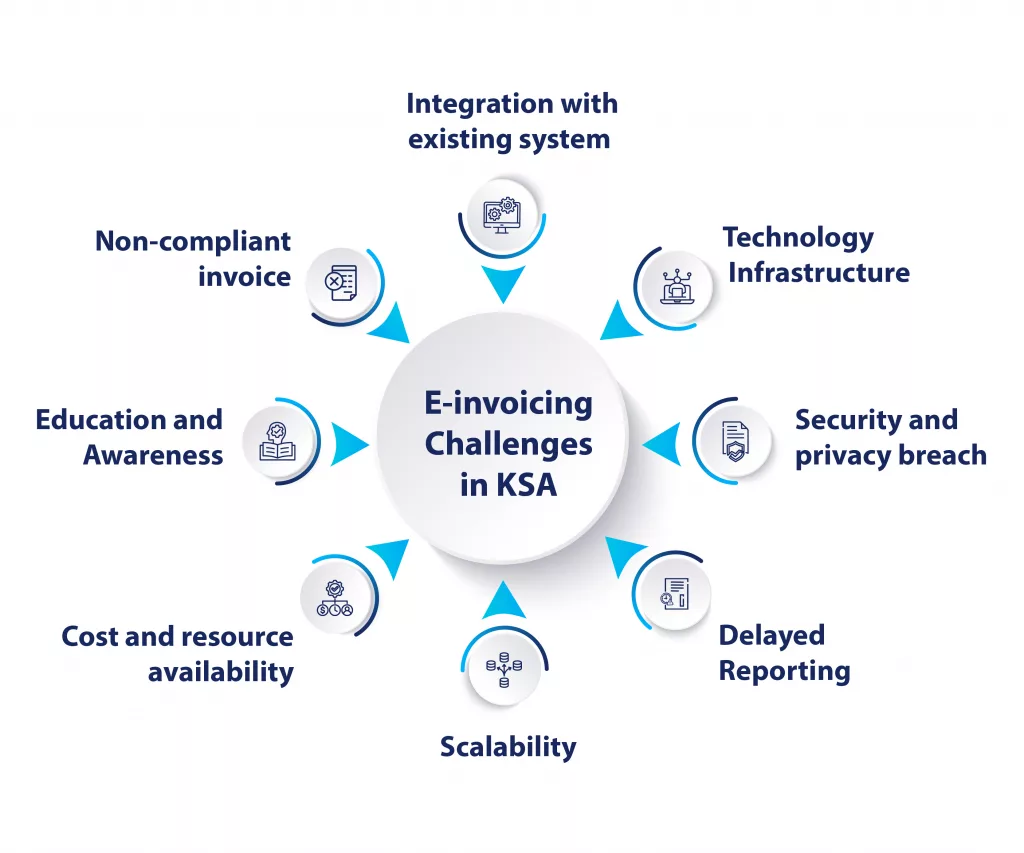In the wake of digitization, businesses and governments across the globe are reshaping traditional practices and modernizing how businesses can conduct financial transactions and how the government requires compliance with the law.
KSA (Kingdom of Saudi Arabia) is advancing digital transformation with the rollout of e-invoicing in two phases. Phase-1 began on 4 December 2021, while KSA Phase 2 e-invoice integration—the integration phase—is being implemented in 9 waves since 1 January 2023. ZATCA (Zakat, Tax, and Customs Authority) governs the implementation and regulation of e-invoicing in KSA.
KSA is the 1st country among GCC member countries to introduce e-invoicing, and the introduction has become a transformative global phenomenon, shifting from traditional invoicing to digitized invoicing, which can be a strategic tool to enhance operational efficiency and prevent fraud and tax evasion. However, every advancement comes with challenges. E-invoicing in KSA has also come with many challenges. This blog will delve into the e-invoicing challenges in KSA and e-invoicing solutions on how to deal with such challenges.
Now, before we dive into the challenges and solutions faced in implementing e-invoicing in KSA, it is crucial to understand what is e-invoicing in KSA and details on its types and Phases, as this would help us to get a clear view of the challenges that can be faced and solutions to be implemented. This detailed understanding can be referred to from KSA E-Invoicing Phase 2: Navigating Requirements.
Now that we have a brief overview of KSA e-invoicing, we shall understand the challenges faced in KSA e-invoicing implementation and what solutions can be implemented.
E-invoicing Challenges in KSA

- Integration with existing system: Integrating e-invoicing solutions with existing ERP systems in KSA poses significant challenges for businesses, particularly large enterprises with complex infrastructures. These challenges include harmonizing multiple ERP systems, coordinating data flows across diverse POS systems in different locations, and aligning customized ERP architectures with standardized e-invoicing protocols. Additionally, the integration process may encounter hurdles related to data synchronization, compatibility issues, and network connectivity between various systems. Customization and legacy aspects of in-house ERP systems further complicate alignment with standardized e-invoicing protocols, potentially leading to disruptions in business continuity if not managed effectively.
- Non-compliant invoice: KSA has its requirements in terms of e-invoice generation, such as Invoice generation requirements, which include specific tax invoice formats, fields, storage, etc. Security and integrity requirements include e-invoice generation device registration, UUID, hash, QR code, cryptographic stamp, etc. Integration requirements for Invoice reporting and clearance. Any non-compliance to this requirement invites fines and penalties to the business.
- Technology Infrastructure: Companies must upgrade their existing technology infrastructure and solutions to make them compatible and easily integrated with the government’s platform. This transition may sometimes create errors and discrepancies requiring time and experience, hindering business operations.
- Education and Awareness: Evolution without proper knowledge is entirely vain. Unless businesses and management understand the importance of any change and implementation imposed by the government and without providing adequate training to run the systems and solutions smoothly, it isn’t easy to achieve the desired outcomes.
- Security and privacy breach: Unauthorized access to the e-invoicing solutions may leak and misuse essential data. Therefore, if the e-invoicing solution does not have robust authentication mechanisms, inadequate encryption methods, etc., it may lead to vulnerabilities of privacy and security breaches.
- Cost and resource availability: With the implementation of e-invoicing, businesses must upgrade their existing systems and acquire e-invoice systems and solutions with proper connectivity, which are compatible and can integrate with ZATCA websites.
This can require finance for acquisition and upgradation and other resources such as time and management to walk through this process and implement solutions as per ZATCA’s requirements. It might not concern larger businesses, but it might be challenging for middle and small companies to make finances and other resources available.
- Delayed Reporting: ZATCA requires standard tax invoices to be reported to their portal in real-time, while simplified tax invoices must be reported within 24 hours of generation to be considered valid. However, inadequate internet connectivity and slow response times can significantly impede this process, particularly during peak hours of business activity. Such delays not only hinder compliance efforts but also disrupt workflow efficiency, potentially leading to penalties or fines for non-compliance. Furthermore, customers may also experience issues such as delays in receiving invoices or difficulties verifying the validity of transactions, eroding trust and satisfaction levels.
- Scalability: With increasing business transactions, the tax-compliant e-invoicing solution can also handle and process such transactions. Lack of adequate scalability may create challenges for the business organization.
KSA e-invoicing solutions
An effective KSA e-invoicing solution serves as a comprehensive answer to overcoming the challenges encountered during the implementation of E-invoicing in KSA. The following points can be considered to evaluate the effectiveness of the e-invoicing solution.
- Any solution must adhere to the requirements set forth by ZATCA. It should ensure that any necessary changes to the system to meet ZATCA’s regulations are implemented swiftly, with minimal turnaround time. Additionally, in the event of any errors during implementation, the solution provider should take minimum resolution time and align the solution promptly with ZATCA’s rules and regulations. It should also have the ability to reverse transactions if needed to rectify errors and ensure compliance. It’s crucial for businesses to have a solution that not only meets ZATCA’s requirements but also offers efficient support and resolution mechanisms to minimize disruptions and maintain compliance standards.
- The implemented E-invoicing solutions must have robust data encryption, authentication measures, and compliance with data protection regulations. Regular security audits and guidelines for secure data handling are essential.
- The solution provider must have experience and expertise in integrating with APIs.
- The solution provider must provide proper demos, testing, and brief about the system and solutions.
- A solution must have proper internet connectivity to avoid undue processing time. For the simplified tax invoices, the e-invoice solution shall have an offline utility where invoices can be generated initially without the internet and uploaded to the ZATCA portal in bulk later.
Remember that the lowest cost option may not always provide the best value or quality. No matter how much cost is necessary, it should not cause operational deficiencies in business. Therefore, choosing the correct solutions is vital for any business organization.
Cygnet provides cutting-edge KSA e-invoicing solutions. We offer businesses a transformative platform to streamline invoicing processes and overcome implementation challenges. With robust features ensuring regulatory compliance, seamless integration, and advanced security measures, our solution is the comprehensive answer to modernizing transactions. Boasting user-friendly interfaces, our e-invoicing solution simplifies operations and enhances efficiency, making it the ideal choice for businesses seeking a reliable and innovative invoicing platform.
To Summarize
Implementing e-invoicing is a transformative process in modernizing financial transactions, but it is not without challenges and necessitates strategic solutions for successful adoption. As businesses navigate this transformative landscape, a comprehensive strategy encompassing technology, education, and adaptability becomes imperative for a successful e-invoicing implementation.










